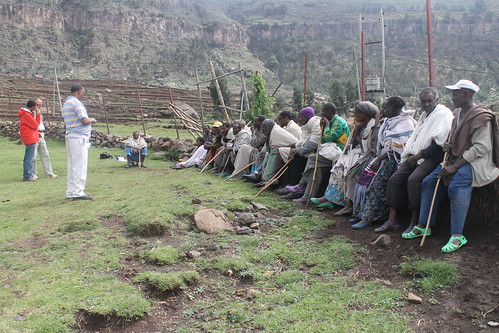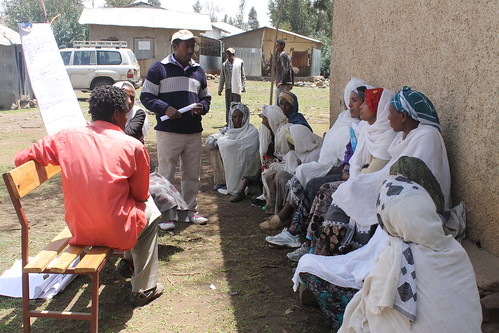Participatory community analysis completed in eight Africa RISING sites in Ethiopia

In 2013, the Africa RISING team in Ethiopia carried out Participatory Community Analyses (PCA) in all the eight sites.
This was the first phase in a participatory research and extension process, including kebele engagement and social mobilization, that provided each kebele some opportunities to analyse their own challenges and opportunities. Over 250 men, women and young people participated in the process with facilitation by multidisciplinary teams drawn from Universities, Research Centres and Woreda Agricultural offices.
The analysis showed that each kebele is dominated by an integrated crop-livestock system providing important sources of food and cash. Major crop production challenges include a lack of improved seed, low and declining soil fertility, problems of pests, disease and weeds, a lack of draft power and equipment and the high cost or non-availability of agri-inputs associated with each of these. These challenges are compounded by increasingly erratic rainfall, drought, floods and land degradation.
The kebeles also raised concerns about lack of crop storage facilities, post-harvest pest and disease problems, lack of knowledge about processing with little or no processing equipment, low market prices, inadequate access roads and poor transport facilities.
Regarding livestock, kebele members raised problems included lack of feed, pests and diseases, poor access to veterinary services leading to high animal mortality rates, compounded by a lack of improved breeds and inadequate watering points in many areas. Marketing challenges included low prices, having to sell when prices are low and a general lack of market information.

Possible interventions identified by the participants include the introduction of sustainable crop and livestock management practices supported by training in production, utilisation and processing skills as well as leadership, marketing and communication skills to encourage farmer-to-farmer learning and extension.
Shortages of improved varieties of most crops indicate a need for kebele-based seed production. Shortages of agro-chemicals and veterinary products for crop disease and pest control and animal health require links to be built between farmers, suppliers and existing animal health facilities. Opportunities for sprayer contractors, kebele-based pest doctors and kebele animal health workers (paravets) were identified. An urgent need was to improve animal feed through better use of existing crop residues.
Download the report




